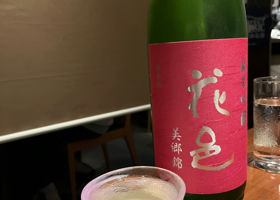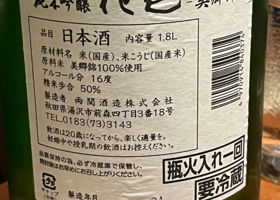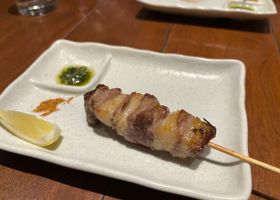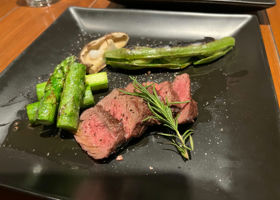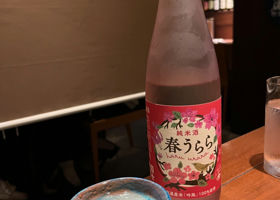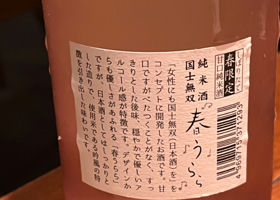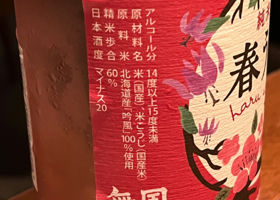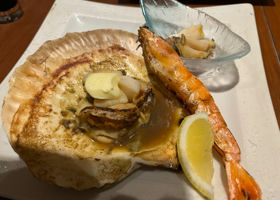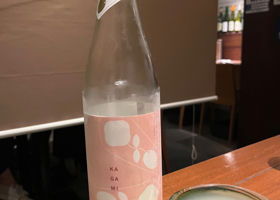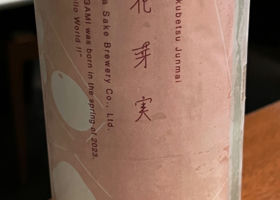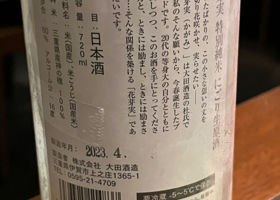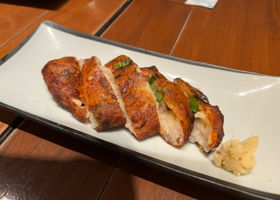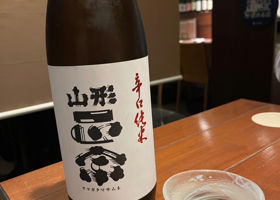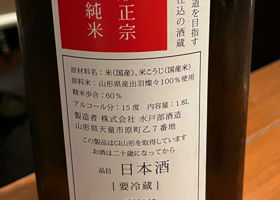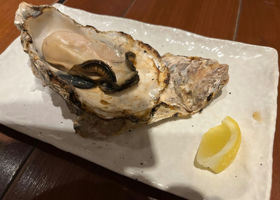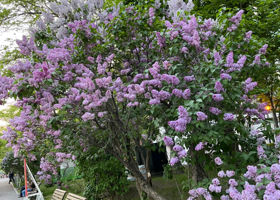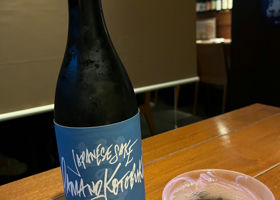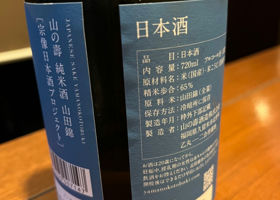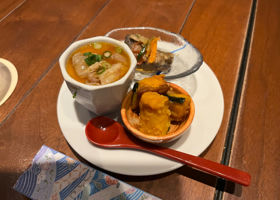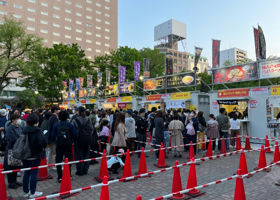Timeline
しんしんSYNow that the meat dishes have been served, it's time for the last sake.
Tobiroki, kafuda-shu, or Hanayuup?
After much deliberation, we asked for the Hanayu Sangonishiki with a red label!
Fruity and sweet as usual!
Very nice!
Pork skewers and venison!
It looks like beef, but it is a very tasty deer 🦌!
After this, dessert ice cream!
A dessert that looks like an Insta-worthy 🍨!
I can only post 4 pictures of Sake-no-wa, so if you are interested, go to the restaurant!
Mr. I is waiting for you!
knowledge
Ingredients: Misato Nishiki
Rice polishing ratio: 50
Sake degree: -6.7
Acidity: 1.5
Amino acidity: 0.8
Alcohol percentage: 15
This is a special Junmai Ginjo made entirely from Miso Nishiki rice grown in Akita Prefecture, which is a seasonal product of Hanayu.
As in the past, each bottle is carefully bottled just after pressing. The sake is bottle-fired, which gives it a well-balanced flavor, a gorgeous aroma, and a rich umami taste. The clean, juicy sweetness that leaves no aftertaste will satisfy the drinker.
しんしんSYI called Mr. I to ask him if he had any hidden sake and he recommended it to me, and here it is!
It has a cute label.
Where is this sake from?
A new brand made by Kokushi Musou in Hokkaido!
Haru-urara
Reminds me of Masamitsu Tayama if you are from my generation!
This is still sweet!
It seems to have been developed to appeal to women.
I don't dislike this kind of sweetness!
We were served grilled shishamo (male and female) and grilled seafood from Mukawa!
I like the contrast of the sweetness with the saltiness of the dish. ❤️
extensive knowledge
This is a spring limited edition sake with a mild and gentle alcohol taste, developed with the aim of "offering Kokushimusou to women as well". It is a gentle, light, refreshing and slightly sweet sake.
Rice used: Hokkaido rice polished to 60% Ginpu
Sake meter / -20
Acidity/1.7
Alcohol / 14 しんしんSYUnknown brands on the menu
Kagami Special Junmai Nigori Unpasteurized Sake
It's labeled as a Mie sake.
Let's try this one!
It's a cloudy sake!
Umashuwa in the mouth!
The taste reminds me of Momoten.
I love this kind of sake!
Hot and freshly made Satsuma-age!
The inside is so soft!
There are sakura shrimps in it, and I think they must be made from yam!
extensive knowledge of the ingredients
New brand released by Ota Sake Brewery in Mie Prefecture
Origin of the brand name "Kagami" (meaning "flower bud fruit")
Mr. Yuki Ota, the toji, became a toji at the age of 25 and is currently in his third year. The word "kagami" (flower bud/fruit) represents Mr. Ota's desire to "nurture and bring to fruition his still small goals and thoughts, like flower buds. The word "flower buds/fruits" projects the strong desire of this still young man to grow with the brand and fulfill his dreams.
The words "flower/bud/fruit" when broken down into "flower/bud/fruit" represent the never-ending workings of a fruit tree: flower buds sprout during the winter, flowers bloom in the spring, fruit is borne in the fall, and winter comes again.... It is linked to the sake brewing process.
Rice: 100% Kami no Ho (produced in Mie Prefecture)
Rice polishing ratio 60
Alcohol content: 16%. しんしんSYThere are more than 10 different kinds of sake in the regular menu alone, so ask for the sake that interests you again!
Popular Yamagata Masamune
Which one will be served?
Dry Junmai
I drank this once a long time ago, but my memory is not so clear.
But when I see Sake-no-wa, it reminds me of that time.
It's a good app!
It's dry, but not too dry.
The waiter asked me whether I wanted grilled or raw oysters, so I had them grilled tonight!
The waiter told me they were Maruemon!
The oysters were so plump and sweet, and paired with a dry Junmai sake!
Yumaka!
Lilacs were blooming beautifully!
Let's go for an early morning walk tomorrow and admire the lilacs!
extensive knowledge
Yamagata Masamune's only "super-harsh" sake. It is made from 60% Dewa Sanzu rice, which is suitable for sake brewing, and has a Sake meter of +8. It has the same flavor of "umami and full-bodied standard Junmai-shu", and the "long-term moromi" gives it an excellent balance of breadth of flavor and dryness. It is a sake that you will never get tired of drinking, and of course it is delicious warmed up. It is a great supporting role to complement your food.
Rice/Ideba Sanzu (Yamagata Prefecture)
Rice polishing ratio/60
Sake meter degree/+8
Alcohol/16.0
Acidity/1.5 しんしんSYJust as I was thinking of taking a day off from drinking once in a while, a junior colleague of mine asked me if I would like to join him for dinner tonight.
Let's go!
Mr. I, who helped me at Torin, made a reservation for me at this restaurant where he is in charge of cooking!
Reunion with Mr. I!
Thank you very much for your cooperation this evening!
I told him I would be happy to serve him the hidden sake as well!
First of all, we chose this from the regular menu!
Another version of Yamazato Kotobuki we met last night!
The label is a calm dark blue!
I felt Yamanokotobuki Freaks 2 was a little thin, but this one has a strong rice taste and a deep flavor!
Even if the brand name is the same, the impression will be different if it is made differently.
Lilac Festival has started at Sapporo Odori Park!
A long line of people waiting for the ramen event!
Let's have a drink at Maruyama tonight!
A nice appetizer is served!
extensive knowledge
Made in Munakata, Fukuoka, a World Heritage Site,
This sake is brewed using Yamada-Nishiki produced without the use of pesticides and chemical fertilizers. It has a mild and gentle aroma and taste with the strength of Yamadanishiki.
Ingredients/Rice, Rice Koji
Rice used: Yamadanishiki produced in Munakata
Rice polishing ratio/ 65
Alcohol content/ 16 RecommendedContentsSectionView.title
